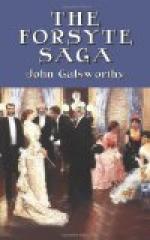After hearing of his father’s death, she wrote to Jon, and received his answer three days later on her return from a river picnic. It was his first letter since their meeting at June’s. She opened it with misgiving, and read it with dismay.
“Since I saw you I’ve heard everything about the past. I won’t tell it you—I think you knew when we met at June’s. She says you did. If you did, Fleur, you ought to have told me. I expect you only heard your father’s side of it. I have heard my mother’s. It’s dreadful. Now that she’s so sad I can’t do anything to hurt her more. Of course, I long for you all day, but I don’t believe now that we shall ever come together—there’s something too strong pulling us apart.”
So! Her deception had found her out. But Jon—she felt—had forgiven that. It was what he said of his mother which caused the guttering in her heart and the weak sensation in her legs.
Her first impulse was to reply—her second, not to reply. These impulses were constantly renewed in the days which followed, while desperation grew within her. She was not her father’s child for nothing. The tenacity which had at once made and undone Soames was her backbone, too, frilled and embroidered by French grace and quickness. Instinctively she conjugated the verb “to have” always with the pronoun “I.” She concealed, however, all signs of her growing desperation, and pursued such river pleasures as the winds and rain of a disagreeable July permitted, as if she had no care in the world; nor did any “sucking baronet” ever neglect the business of a publisher more consistently than her attendant spirit, Michael Mont.
To Soames she was a puzzle. He was almost deceived by this careless gaiety. Almost—because he did not fail to mark her eyes often fixed on nothing, and the film of light shining from her bedroom window late at night. What was she thinking and brooding over into small hours when she ought to have been asleep? But he dared not ask what was in her mind; and, since that one little talk in the billiard-room, she said nothing to him.




